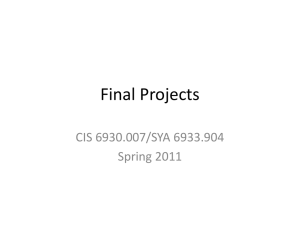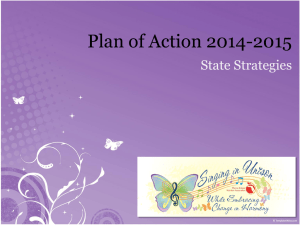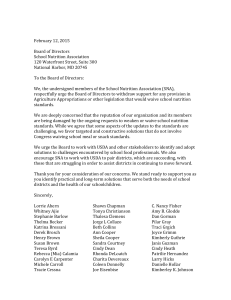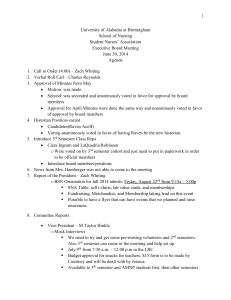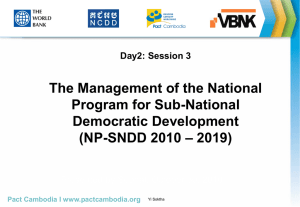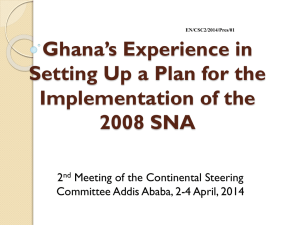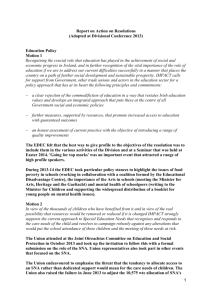Main Proposal - Minnesota Senate
advertisement
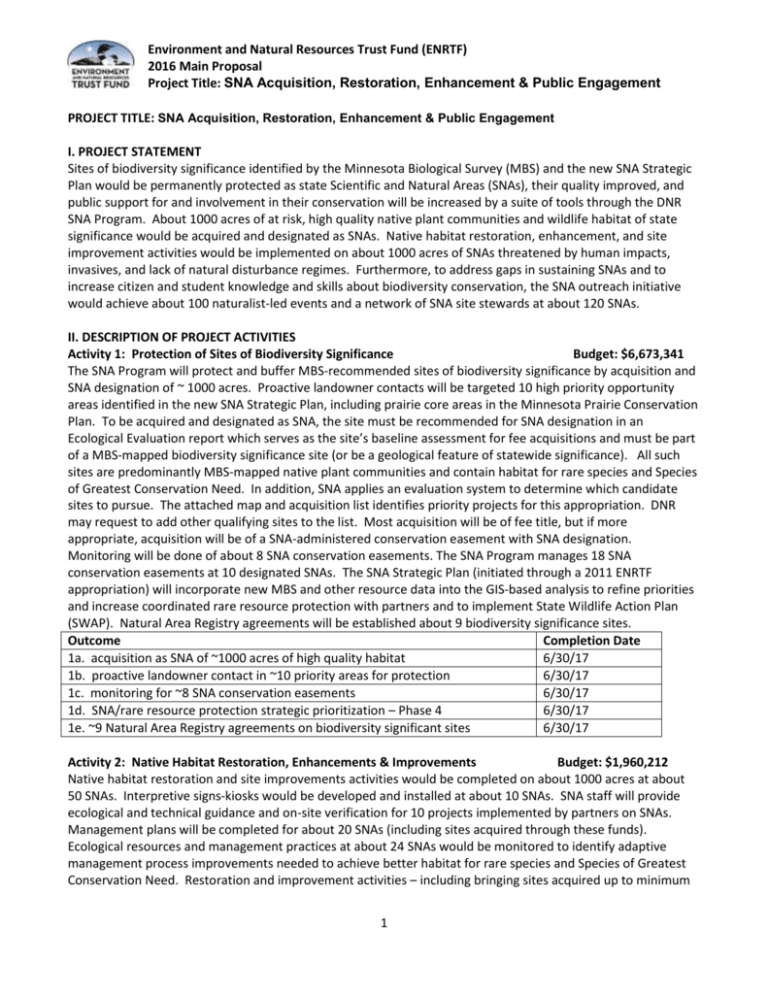
Environment and Natural Resources Trust Fund (ENRTF) 2016 Main Proposal Project Title: SNA Acquisition, Restoration, Enhancement & Public Engagement PROJECT TITLE: SNA Acquisition, Restoration, Enhancement & Public Engagement I. PROJECT STATEMENT Sites of biodiversity significance identified by the Minnesota Biological Survey (MBS) and the new SNA Strategic Plan would be permanently protected as state Scientific and Natural Areas (SNAs), their quality improved, and public support for and involvement in their conservation will be increased by a suite of tools through the DNR SNA Program. About 1000 acres of at risk, high quality native plant communities and wildlife habitat of state significance would be acquired and designated as SNAs. Native habitat restoration, enhancement, and site improvement activities would be implemented on about 1000 acres of SNAs threatened by human impacts, invasives, and lack of natural disturbance regimes. Furthermore, to address gaps in sustaining SNAs and to increase citizen and student knowledge and skills about biodiversity conservation, the SNA outreach initiative would achieve about 100 naturalist-led events and a network of SNA site stewards at about 120 SNAs. II. DESCRIPTION OF PROJECT ACTIVITIES Activity 1: Protection of Sites of Biodiversity Significance Budget: $6,673,341 The SNA Program will protect and buffer MBS-recommended sites of biodiversity significance by acquisition and SNA designation of ~ 1000 acres. Proactive landowner contacts will be targeted 10 high priority opportunity areas identified in the new SNA Strategic Plan, including prairie core areas in the Minnesota Prairie Conservation Plan. To be acquired and designated as SNA, the site must be recommended for SNA designation in an Ecological Evaluation report which serves as the site’s baseline assessment for fee acquisitions and must be part of a MBS-mapped biodiversity significance site (or be a geological feature of statewide significance). All such sites are predominantly MBS-mapped native plant communities and contain habitat for rare species and Species of Greatest Conservation Need. In addition, SNA applies an evaluation system to determine which candidate sites to pursue. The attached map and acquisition list identifies priority projects for this appropriation. DNR may request to add other qualifying sites to the list. Most acquisition will be of fee title, but if more appropriate, acquisition will be of a SNA-administered conservation easement with SNA designation. Monitoring will be done of about 8 SNA conservation easements. The SNA Program manages 18 SNA conservation easements at 10 designated SNAs. The SNA Strategic Plan (initiated through a 2011 ENRTF appropriation) will incorporate new MBS and other resource data into the GIS-based analysis to refine priorities and increase coordinated rare resource protection with partners and to implement State Wildlife Action Plan (SWAP). Natural Area Registry agreements will be established about 9 biodiversity significance sites. Outcome Completion Date 1a. acquisition as SNA of ~1000 acres of high quality habitat 6/30/17 1b. proactive landowner contact in ~10 priority areas for protection 6/30/17 1c. monitoring for ~8 SNA conservation easements 6/30/17 1d. SNA/rare resource protection strategic prioritization – Phase 4 6/30/17 1e. ~9 Natural Area Registry agreements on biodiversity significant sites 6/30/17 Activity 2: Native Habitat Restoration, Enhancements & Improvements Budget: $1,960,212 Native habitat restoration and site improvements activities would be completed on about 1000 acres at about 50 SNAs. Interpretive signs-kiosks would be developed and installed at about 10 SNAs. SNA staff will provide ecological and technical guidance and on-site verification for 10 projects implemented by partners on SNAs. Management plans will be completed for about 20 SNAs (including sites acquired through these funds). Ecological resources and management practices at about 24 SNAs would be monitored to identify adaptive management process improvements needed to achieve better habitat for rare species and Species of Greatest Conservation Need. Restoration and improvement activities – including bringing sites acquired up to minimum 1 Environment and Natural Resources Trust Fund (ENRTF) 2016 Main Proposal Project Title: SNA Acquisition, Restoration, Enhancement & Public Engagement standards – will be carried out by DNR staff- SNA crews, Conservation Corps Minnesota, Sentence to Service, volunteers, and/or contractors. Activities include seed collection, site preparation, planting and aftercare, invasives control, woody encroachment removal, site clean-up, signing, interpretive kiosks, fencing, prescribed burns (or alternative prescribed disturbance for ecological management purposes, such prescribed haying, mowing or grazing, necessary where use of fire is limited), management plan preparation, monitoring, and coordination-oversight of projects implemented by partners. All restoration will use seeds/plants of a local ecotype, collected from onsite or within 25 miles. Restoration and enhancement of degraded and rare land features helps implement the Minnesota’s State Wildlife Action Plan and achieve Habitat Recommendation 5 of the SCPP. This activity and its funding would include all work needed to bring up to the Department’s minimum standards those SNA parcels acquired through this funding and will include that restoration and improvements of newly acquired sites which is ecologically advisable and feasible within the appropriation period. Outcome Completion Date 2a. ~30 acres of restoration of forest, prairie, & outcrop sites 6/30/17 2b. ~370 acres of woody removal & exotics species treatment 6/30/17 2c. ~710 acres of prescribed burns 6/30/17 2d. ~10 SNA interpretive kiosks installed AND development work on ~50 sites 6/30/17 2e. ecological/technical guidance for ~10 partnership projects 6/30/17 2f. management plans completed for ~20 SNAs 6/30/17 2g. adaptive management monitoring on ~24 SNA sites 6/30/17 Activity 3: Public Engagement in Natural Areas Budget: $691,273 The SNA Outreach Initiative will engage residents, students, and other interested people in ecological recreation and education activities on SNAs. This includes supporting a network of about 120 SNA volunteer site stewards; co-sponsoring and coordinating about 100 events including volunteer site restoration and management work days and recreation-educational events (guided nature hikes, citizen-science activities, etc) and evaluating the effectiveness of these actions. New and refined electronic/social media communications tools, maps and interpretive information will be developed and disseminated to increase/ enhance recreationist’s use of SNAs. Outcome Completion Date 3a. SNA website, e-book, social media, maps & other interpretive info 6/30/17 3b. ~ 100 volunteer events (site management work days & rec.-ed. events) 6/30/17 3c. network of ~120 volunteer site stewards 6/30/17 III. PROJECT STRATEGY A. Project Team/Partners This proposal includes the DNR’s work and funding to be used by the SNA Program towards partnership project work on SNAs. Partners include entities, such as The Nature Conservancy, Friends of the Mississippi River, Great River Greening, Sugarloaf Northshore Stewardship Assn., local units of governments, and other non-profits. B. Project Impact and Long-Term Strategy The SNA Strategic Land Protection Plan targets protection of an additional 136,000 acres as SNAs over the next 85 years. Ongoing ecological management of SNAs and public engagement is also needed. Thus, the DNR could utilize ongoing support from the Environment and Natural Resources Trust fund of $5M to $10M per biennium. Annual/biennial appropriations will also be sought from the Outdoor Heritage Fund and state bonding. C. Timeline Requirements Two years (July 1, 2016 through June 30, 2018) is requested to provide multiple field seasons for restoration and development work and to take protection projects through basic improvements needed. 2

